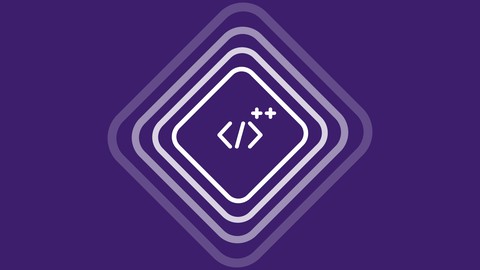
Type-Safe Interfaces with Modern C++
Type-Safe Interfaces with Modern C++, available at $44.99, has an average rating of 4.4, with 18 lectures, based on 15 reviews, and has 143 subscribers.
You will learn about Use type system to your advantage Create safe, rich and expressive interfaces Use Pattern matching to implement metaprogramming Real world scenarios to tackle programming tasks This course is ideal for individuals who are Intermediate C++ developers familiar with C++11/14 aiming to discover and master Modern C++17 utilities and techniques. It is particularly useful for Intermediate C++ developers familiar with C++11/14 aiming to discover and master Modern C++17 utilities and techniques.
Enroll now: Type-Safe Interfaces with Modern C++
Summary
Title: Type-Safe Interfaces with Modern C++
Price: $44.99
Average Rating: 4.4
Number of Lectures: 18
Number of Published Lectures: 18
Number of Curriculum Items: 18
Number of Published Curriculum Objects: 18
Original Price: $109.99
Quality Status: approved
Status: Live
What You Will Learn
- Use type system to your advantage
- Create safe, rich and expressive interfaces
- Use Pattern matching to implement metaprogramming
- Real world scenarios to tackle programming tasks
Who Should Attend
- Intermediate C++ developers familiar with C++11/14 aiming to discover and master Modern C++17 utilities and techniques.
Target Audiences
- Intermediate C++ developers familiar with C++11/14 aiming to discover and master Modern C++17 utilities and techniques.
In this course we’ll learn how to write correct, safe, and performant code by making use of C++’s type system. Firstly, we’ll learn about the Standard Library’s “algebraic data types” and how they can increase safety, performance, and readability of your application/library. We’ll then look at function interfaces. As an example, writing a function that takes a string in such a way that it performs optimally with both std::string and const char* seems like a daunting task. It gets even more tricky with functions taking other functions as input. Is it possible to generalize these issues and provide the “perfect” interface?
About the Author :
Vittorio Romeo is a Software Engineer at Bloomberg LP. He completed his Bachelor’s degree in Computer Science at “Università degli Studi di Messina”.
He began programming at a very young age and is now a C++ enthusiast. While following the evolution of the C++ standard and embracing the newest features, he worked on several open-source projects, including modern general-purpose libraries and free cross-platform games.
Vittorio is an active member of the C++ community: he participated as a speaker at CppCon 2014/2015/2016, ++it Florence 2015 and at his local Linux Day 2013/2014 events, as a Student/Volunteer at C++Now 2015/2016, at Meeting C++ 2015/2016.
He currently maintains a C++-related blog and a YouTube channel featuring well-received modern C++11 and C++14 tutorials.
When he’s not writing code, Vittorio enjoys weightlifting and fitness-related activities, competitive/challenging computer gaming and good sci-fi movies/TV-series.
Course Curriculum
Chapter 1: Variants
Lecture 1: The Course Overview
Lecture 2: Understanding Variants
Lecture 3: std::variant – Basic Interface
Lecture 4: std::variant – Visitation
Lecture 5: std::variant – Use Cases
Lecture 6: std::variant – Recap
Chapter 2: Implementing Variant Pattern Matching
Lecture 1: The Problem with std::visit
Lecture 2: Creating an Overload Set
Lecture 3: Match – Implementation
Lecture 4: Match – Recap
Chapter 3: Optionals
Lecture 1: What Is an Optional?
Lecture 2: std::optional – Basic Interface
Lecture 3: std::optional – Use Cases
Chapter 4: Function Parameters and Ownership
Lecture 1: std::string
Lecture 2: std::string_view – Introduction
Lecture 3: std::string_view – Basic Interface
Lecture 4: std::string_view in Interfaces
Lecture 5: Other Examples of Owning/View Classes
Instructors
-
Packt Publishing
Tech Knowledge in Motion
Rating Distribution
- 1 stars: 0 votes
- 2 stars: 1 votes
- 3 stars: 0 votes
- 4 stars: 4 votes
- 5 stars: 10 votes
Frequently Asked Questions
How long do I have access to the course materials?
You can view and review the lecture materials indefinitely, like an on-demand channel.
Can I take my courses with me wherever I go?
Definitely! If you have an internet connection, courses on Udemy are available on any device at any time. If you don’t have an internet connection, some instructors also let their students download course lectures. That’s up to the instructor though, so make sure you get on their good side!
You may also like
- Top 10 Language Learning Courses to Learn in November 2024
- Top 10 Video Editing Courses to Learn in November 2024
- Top 10 Music Production Courses to Learn in November 2024
- Top 10 Animation Courses to Learn in November 2024
- Top 10 Digital Illustration Courses to Learn in November 2024
- Top 10 Renewable Energy Courses to Learn in November 2024
- Top 10 Sustainable Living Courses to Learn in November 2024
- Top 10 Ethical AI Courses to Learn in November 2024
- Top 10 Cybersecurity Fundamentals Courses to Learn in November 2024
- Top 10 Smart Home Technology Courses to Learn in November 2024
- Top 10 Holistic Health Courses to Learn in November 2024
- Top 10 Nutrition And Diet Planning Courses to Learn in November 2024
- Top 10 Yoga Instruction Courses to Learn in November 2024
- Top 10 Stress Management Courses to Learn in November 2024
- Top 10 Mindfulness Meditation Courses to Learn in November 2024
- Top 10 Life Coaching Courses to Learn in November 2024
- Top 10 Career Development Courses to Learn in November 2024
- Top 10 Relationship Building Courses to Learn in November 2024
- Top 10 Parenting Skills Courses to Learn in November 2024
- Top 10 Home Improvement Courses to Learn in November 2024






















